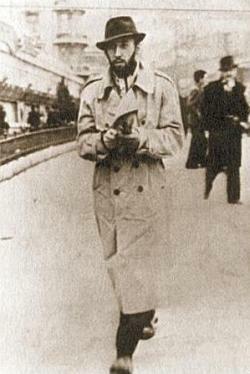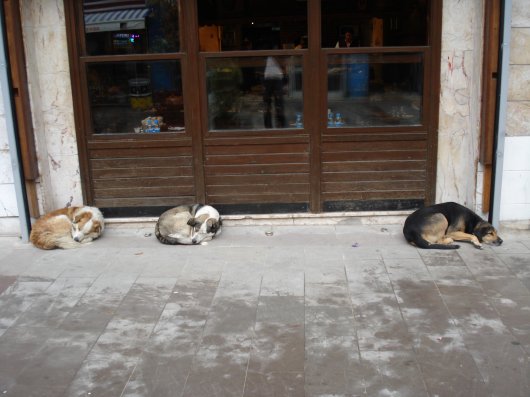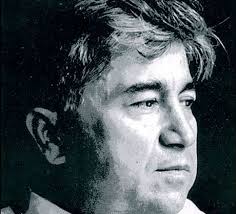This story may mainly be of interest to writer friends, but I think it's funny for everyone, of course. I translated it for my roommate's birthday present. This is for you, The Michael!
How Do I Write, You Ask?
by Aziz Nesin
Translated by Jeff Gibbs
I got a letter; it wasn't only to me. It had been sent to several writers. It began something like this. "As you know, readers are curious about writers, about what lies beyond their works and words..."
The writer of the letter says "As you know" but to tell the truth, I don't know. Do readers really wonder about "what lies beyond the writings and works?"
Let's read the rest of the letter.
"One of the peculiarities readers are most curious about is what kind of surroundings writers work in."
Ah, now I think I'm starting to get what these readers are on about. To be frank, readers are curious because they expect the abnormal, the bizarre, the surprising, and the shocking. Or, to be more frank, that's how they desperately want it to be.
Now let's skip to the letter's list of questions and give our answers.
Question: "What sort of atmosphere do you write in?"
Answer: This atmosphere...well, it changes according to the genre I'm writing. Say if I'm writing something serious, I close tight all the doors and windows in my room. There's a skull on my desk, and I scoot my lamp over so that it lights up the eye sockets. In order to focus on the topic, I need the house to be as silent as death. And in this death-silence, I must have music continuously playing. Brahms. Bach. Beethoven. You know--I'll listen to any of the works by the big three with Bs at the beginning of their names. And to keep alert, I must not let the room's temperature rise above sixty degrees Fahrenheit. Because of this, I can't write anything serious in the summer. Nothing. As soon as I start to write, the subject matter turns funny.
If I am writing something nationalistic, I write in the same sort of surroundings. Only, since I'm writing about the Turkish Republic, you will find a bottle of raki with ice and a bowl of roasted chickpeas--Turkey's quintessential combo. And if the writing hits a difficult spot, I just drink some raki and catch a buzz. To make whatever I'm writing more universal, I'll mix up some whiskey and vodka and drink a little brew I've dubbed "Kogistans."
If I write something lyrical and romantic, I seclude myself in a hotel on a mountain top or on the shore of some lake or sea. It's not for the quiet. I choose these places so I can peek through the key holes of the hotel rooms. This way, I can both research social life up close and personal, and get a rise out of what I see. Because writers are people who need a rise now and then.
For funny stories, I prefer a hamam or near an animal market, anywhere where there's lots of noise. To work up the urge to write, I go out and get mixed up in Istanbul's seediest places. At one time, I'd wander around the bars and betting joints, and with the inspiration I got there, head to one of the early morning cafes, or if the season was summer, down under the bridge to one of the barges and scribble away in my notebook. And sometimes, without telling a soul, I'd live the life of a vagrant for weeks at a time.
If I said this or some similar nonsense, it would really peak a reader's interest. If, on the other hand, I said I could not write if I didn't have some hot little blond on my lap while I sat at my writing table, well then, they would understand this to be a lie and not believe me. But if someone else secretly wrote it about me, they'd believe it and find it fascinating. It's not just writers. There's a tendency to see all artists as half mad or completely nuts. And some artists, in the most affected manner, scratch their readers' itches by becoming wannabe madmen.
I know a poet, who has rented himself a space in an office building that calls to mind the mildly luxurious digs of a real estate broker. You can always find a half empty bottle of booze on his desk as he wants to give the impression to visitors that he's a nonstop drinker. And though he never touches alcohol, as soon as he sees the door crack open, he immediately snatches up a glass.
Take the most beautiful poem of a poet. If she claimed that she had written it while standing on top of Beyazit tower about to hurl herself to her death below, her readers, would take much more interest in this mad desire than in her work. I think there are no more well-known painters on the face of the earth than Van Gogh, Gaugin, and Toulouse Lautrec. And its not solely for their work, this fame. Their insanity and crippled lives have taken precedence.
There are forty or fifty famous names in the history of world philosophy, art, and literature, and many people, though they have read not one of their works, know that so and so is homosexual and are more eager to find out whether they are a top or a bottom than to know anything about what they create.
And there are also those writers who try to tickle their readers' curiosity with shocking behaviors. Now if they have true value and artistic power, then purposely engaging in this sort of baloney merely helps get their works known. But if they have no value, they become a public laughing stock and the topic of ridicule. Orhan Veli got rid of his beard for this very reason. (At that time, people in Turkey were not accustomed to young men shaving their beards.) In a way, if nothing else, you could say this was his idea of rebelling against society's rules. One night, Veli, while staying at the house of a famous painter in Pendik (1), thought until morning about how in the world to ensure that his poems would be widely read. He decided to shower them down over Istanbul from a plane. But how would he find the money to rent a plane?
Two or three days later, in every magazine and newspaper, reporters were making fun of a line from one his poems that read, "If I were a fish in a bottle of raki." Now thanks to these jokes, there was no need for the plane. The media wisecracks had had the effect of not one, but a whole squadron of planes raining his poems over Istanbul. If Veli had not been a worthy poet, he would have simply become an object of ridicule for this crap, a buffoon. But later, once his status as a master poet was established, it was the ones who mocked him who were regarded as buffoons.(2)
When I explained this to a few Romanian writers in Bucharest, one of them told the following story. There was a young writer whose name I can't remember right now. He put out lots of books, but no one took an interest. In fact, not one review had been written about him. One day, the newspapers claimed that the young poet had killed himself. All the critics rolled up their sleeves and set to work, heaping praise on him in the media. His books were published one after the other. Two or three months later, one of the authors of all this praise saw the writer famed for his suicide in a pub and threw a fit. "You low, vile..." Okay, why were the writers so silent before his death? This Romanian poet, like Veli, was also quite talented and did not become a laughing stock at all.
I don't think readers really want to know the actual environment in which I write. But you asked, so I'll tell you. I don't really have an "environment". What does that mean anyway? No Turkish writer has been in a position to look for the ideal "writing environment" in order to work. Wherever and however we find ourselves, that's where we write. Only in recent years have they begun taking our screenplay writers and film producers to write in quiet hotels. They close themselves up in these luxury resorts and for fifteen or twenty days do nothing but eat, sleep, and work. Now these writers know that they aren't going to be able to write any better scripts in these comfy surroundings. But since filmmaking is rather costly, don't these writers deserve at least five or ten days rest in this mortal world. Not one of the screenplays written in these places have been seen as having any artistic value. If they had been written in Dolmabahçe Palace, would that somehow have made them better films?
I generally write most of my stuff at home in a room packed floor to ceiling with books. And my wife constantly berates me about it. "What Turkish writer has ever had a 'special writing room' like you, and still you complain!" When I start writing, the doorbell will ring. I'll wait for someone to open it, but no one will, and to save myself from the headache of a bell, I'll get up and go do it myself. The doorman will come sometimes, or the grocer's assistant, or the kid from the vegetable market, or the water guy, or the milkman, or the maid, or a beggar, or a shoe salesman, or some guy going from door to door collecting money with a voucher from a charitable foundation. And between all this ringing of doorbells and the opening of doors, I'll try to gather my thoughts and return to where I left off. Then I'll have breakfast. And again, I'll have to leave the writing room.
If it's a school day, my two boys will start raising a ruckus fighting each other, and I'll try all different ways to calm them down and make peace between them. Then the paperboy will come, and I'll get all worked up over the stories filled with murder, scandal and poverty. Then I'll try to write again. Then an acquaintance or two will come over. And because they are just like those people who either always need help or to borrow money that they will never pay back, they begin to spill all their problems and come to consult me about things I've never even given the first thought to. And though I'm having trouble publishing my own stuff, there are readers of novels and plays and poems and stories who'll leave things for me to read and find publishers for. And between all of these visits, you'd better believe my creditors come calling.
Now because everyone at my house tends to come and go at their own whim, I usually prepare my own lunch and eat alone. After lunch, people I barely know or can't even remember arrive. And they always say (as if I could have been doing anything else) "I bet you were working!" And then add, "And here we are keeping you from your job!" before babbling away for at least an hour. Then again the bell. People coming and going. And then the evening comes, and dinner, and more noise and chaos, and more people coming and going. After midnight, everything calms down. Since there's no one else to do it, I make my own tea. And then I retreat to the room that, as my wife is continuously driving into my head, no other Turkish writer has. And then, goddamnit, I get sleepy. This is how it is. If I can find time in between all this, I write.
Question: "How do you write?"
Answer: So readers are curious about this as well. Well, I write just like that, you know, just like I came out of my mother--stark naked. Curious, isn't it?
Unlike some famous writers, I don't write by pacing the room furiously, thrusting my feet in warm water, and lying down. I do hand stands instead, and once I pass my legs over the nape of my neck, I start working. Blood is something that really gets my heart pumping. And since I can't drink human blood, I've gotten into the habit of going to the refrigerator, pulling out a pitcher of chilled rabbit blood, and pouring myself a glass before I write. Until I've had that rabbit blood, of course, I just can't get into the right frame of mind.
Now' If it were really like this, readers would love it, I'm sure, but I write like any other normal person writes. And it's never entered my head to write in any other way. There's a paper in front of me, a pen in hand, and I start.
For the past seventeen years, I've gotten a disease called "writer's cramp" in my right hand from writing so much. And that hand, which can do any other job with ease, rebels against me when I work. Because of this, I prefer to type everything these days rather than write by hand.
Maybe it will be of interest to readers to know that I sit cross-legged on the chair when I write. It's a habit left over from when I was a child. In our destitute house, I always sat this way. I think this might be one reason I'm so short. When I sit in a chair, I can't find a good spot to rest my leg against, so I sit with my right leg under me. Maybe that could be considered rather weird.
Question: "How do you get yourself ready to write?"
Answer: Now look, this is important. Before I start writing, I launch into a furious tantrum. I scream at everyone in the house and call them over to make demands. Get me this! Get me that! I kick and stamp my feet in rage. I don't just gnaw on my fingernails, but on my pens, and I throw fragile things around the room just to see them shatter. And when I get into this state, they say, "My God, inspiration has come! He's going to write! Quiet everyone! Quiet!" And not a peep will be heard anywhere in the house.
Come on. I mean, where do you come up with this stuff? WHERE? That artists have these breakdowns before or while giving some great work to the world. Please!
Do you have any idea what one of my biggest fantasies in life is? I want play the part of the needy spoiled brat a little, and I mean just a little bit. I want to at least act like I'm throwing a tantrum and whine a little so that everyone waits on me, even if it's all just for show. In that moment before creation, I'll fall into my role, and as a favor to me, I want everyone around me to put up with this for a measly five minutes. But right, like this will ever happen! It's always them that throw the tantrums. And whenever I finally start to sit down to write something I consider important, they start making demands of me a hundred times anything I could come up with.
Question: "Do you find your topics, or do they find you?"
Answer: I wonder what sort of answers my curious readers are expecting? That my topic rings the doorbells and says, "Hi! Here I am!" Would they like that? Or if I said that, like those stupid whirling dervishes in the dark ages, I went wandering the mountains and steppes searching my topics out?
It's true, either of these methods would do. If I took all the notes collected on various topics that I have right now and added not one new one, I could never finish writing about them even if I worked nonstop for the next one hundred years. A writer's worst tragedy are the topics he leaves behind after his death, half of which no one else but he will be able to write.
I don't write about topics that I search out nor about topics that "come to me" for the simple reason that in both cases, you need time and money. Here's what I do, I sit down at my table and write about whatever will earn me the most money to pay for whichever of my expenses is in the most dire need of being paid.
Question: "Do writer's prepare their own suitable writing environment or do they wait for one to be born?"
Answer: What does "suitable writing environment" mean? I've never seen any such place in all my life and don't even know what it would look like. A lot of our writers work in prisons, and I myself have written in a prison cell.(3) I wonder if this is what you mean by "suitable writing space"? If so, then no, indeed I do not prepare my own writing environment. And if I waited for one to be born....come on, forget about our generation, the generation after us would also have to wait a long long time.
Question: "In order to write, which part of the day (evenings or daytime) or hours do you usually choose?"
Answer: Nights, towards morning. I especially prefer nights when the moon is out because in the dead hours of dark, the monsters awake. According to people who have seen it happen, the shape of my face begins to change, my hands turn into claws. In other words, man by day, beast by night!
What Turkish writer has the write to choose his own writing time? Night, day, whenever, if I get an opportunity, I write.
Question: "If you qualify the emergence of a work of art as a "birth", then how do you go about this "birth?"
Answer: There is no one specific way. Some of them, I birth by Caesarian, and sometimes I get very frantic and pop them out the old birth canal one after the other. Look, I've been well "fixed" and can't birth a thing. Oh, I really can't stand this whole idea of birthing, this business of calling writing a story "giving birth". What can we do? I'm considered a prolific writer, but it's not because I'm actually prolific. I'm not pushing myself to produce. I write as soon as someone asks me too, because my financial conditions are frightful enough that they help me make these babies; help me to lay eggs, even.
ENDNOTES
1 Pendik: A bedroom community on the outskirts of the Asian side of Istanbul
2 In 1947, writer Sait Faik asked Veli about his raki fish line, all the talk in the papers. Veli's answer was this, "This poem is explaining the life of an old junk collector, a man in poverty. A man like this wants a great many things, food, water, and of course, raki. This line can be understood as a way to exaggerate that desire." But his friend wrote this in 1950 (and this could be apocryphal, "One day I asked Orhan if he had written that line believing it to be a poetic. He said, 'Of course not." The bizarre lines simply got people to read him. He went on to say that if he had known it would work so well, he would have stuck such bullshit in other poems, too.
3 Aziz Nesin has been and out of prison many times as a political dissident. In the 40's, he created a magazine with another comic writer, Sabahattin Ali, called Marko Pasha that published political satires. They were arrested after the third issue, and Parliament specifically mentioned Marko Pasha as proof that martial law was necessary







